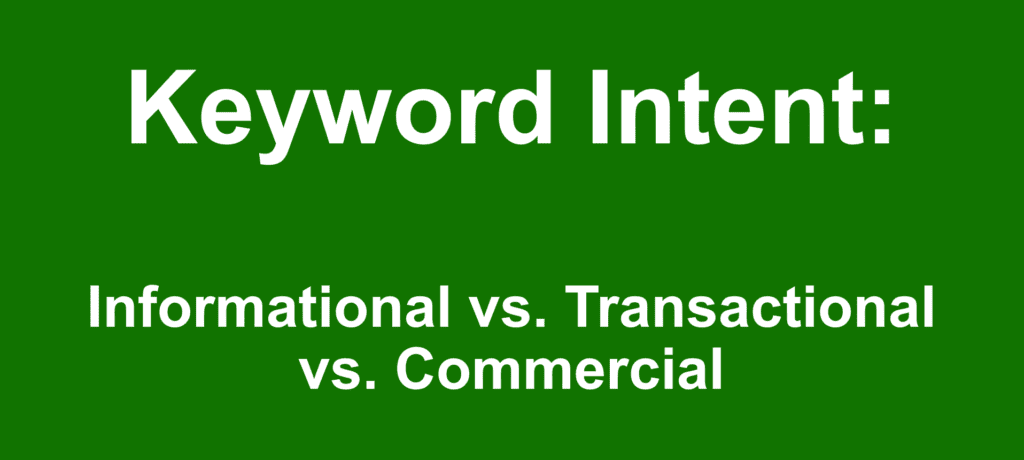Different keywords serve different purposes in the user’s search journey. From providing information to making a purchase, keyword intent can be categorized into three main types: Informational, Transactional, and Commercial.
Let’s look into the differences between these keyword intents and how you can use them to boost your online presence.
Informational Keyword Intent
Your website’s keyword strategy should include a mix of different types of keywords to attract visitors at various stages of their buying journey.
Informational keywords focus on providing valuable and informative content to users seeking answers or solutions to their queries.
By understanding and targeting informational keywords, you can capture the attention of users who are looking for information rather than making an immediate purchase.
Understanding Informational Intent
On the internet, users search for a wide range of information, from researching a topic to finding solutions for a problem.
People who search for this type of keyword are typically at the early stages of the buying cycle.
This is when they will be seeking educational content, guides, tutorials, or answers to their questions.
By creating high-quality and relevant content that satisfies their informational needs, you can establish your website as a trusted source of information in your industry.
How to Identify Informational Keywords
Start by looking for search terms that are related to asking questions, learning about a topic, or finding educational resources.
Tools like Google Keyword Planner and SEMrush can help you discover relevant informational keywords that are relevant to your target audience.
By identifying and targeting informational keywords, you can reach a wider audience and attract more organic traffic to your website.
Transactional Keyword Intent
Transactional keywords signal a clear intent to make a purchase or take a specific action
These keywords are highly valuable for businesses, because they represent prospects who are ready to convert.
The Goal of Transactional Searches
Keywords with transactional intent are key to driving conversions.
When a user searches for a transactional keyword, they are looking to complete a specific action such as buying a product, signing up for a service, or downloading an app.
Businesses can capitalize on these searches by optimizing their content and ad campaigns to target users ready to make a purchase.
To identify transactional keywords, look for specific terms that suggest an intent to take action.
Some examples of these terms include “buy,” “order,” “download,” “subscribe,” or “sign up.”
These keywords are direct indicators that the user is ready to engage with a product or service.
How to Identify Transactional Keywords
eCommerce sites, service providers, and businesses looking to drive conversions are all great use cases for transactional keywords.
By targeting transactional keywords, you can attract users who are at the bottom of the sales funnel and ready to make a purchase.
Make sure to include these keywords strategically in your content and ad copy to maximize your chances of converting these valuable leads.
Commercial Keyword Intent
Commercial keywords signify that the user is in the consideration stage of the buyer’s journey. At this stage, they are moving forward toward making a purchase decision.
How to Recognize Commercial Intent
With commercial intent keywords, users are actively looking to compare products, read reviews, or find the best deals.
These keywords often include terms like “buy,” “discount,” “deal,” “purchase,” or specific product names.
Once you can identify these keywords, you’ll be able to tailor your content and offerings to meet the needs of potential buyers.
Commercial intent keywords may also include local identifiers like “near me” or “in [specific location].” Searches like these indicate a high likelihood that they are ready to convert.
How to Benefit from Commercial Keywords
Keywords that show commercial intent are valuable for any business aiming to drive conversions.
To employ these keywords effectively, consider the following tips:
- Create compelling ad copy that resonates with users ready to make a purchase decision
- Optimize product pages and landing pages for conversion by including clear calls-to-action and easy navigation
Commercial keywords can yield significant returns in paid search campaigns and SEO strategies.
Combining Keyword Types for Strategic SEO
Keep in mind that a well-rounded SEO strategy should not rely solely on one type of keyword.
Try combining informational, transactional, and commercial keywords strategically. This is how to optimize your content to attract a wider range of users and drive more traffic.
This approach can help improve your organic rankings and increase the likelihood of converting visitors into customers.
- Informational keywords provide valuable content to educate users
- Transactional keywords target users ready to make a purchase
- Commercial keywords aim to promote products or services directly
So take advantage of all three types to map your content to the buyer’s journey. As a nice side effect, you’ll also align your content’s relevance better with real customer needs.
By effectively integrating different keyword types, you will create a more comprehensive and engaging SEO strategy.
Finding the Balance in Keyword Strategy
Keyword research is important in finding the right balance between informational, transactional, and commercial keywords.
By analyzing search volume, competition, and user intent, you can identify the most effective keywords to use.
And be sure to focus on striking a balance that caters to the needs of your target audience while also aligning with your business goals.
Conclusion: Target the Right Keyword Intent
Now you can clearly see the importance of keyword intent when it comes to search engine optimization and conversion rates.
By providing the right information at the right time, you can attract more qualified leads and improve your overall online visibility.
Remember to always keep the user’s intent in mind when selecting keywords. You’ll enjoy higher traffic volumes, more conversions, and ultimately, increased revenues.
Tommy Landry
Latest posts by Tommy Landry (see all)
- Black Hat AEO Is Here: Google AI Overview Manipulation Is Happening - February 24, 2026
- Where AI Introduces Risk Into Revenue Planning - February 19, 2026
- AI Is Already Influencing Your Forecasting. Do You Know Where? - February 18, 2026





